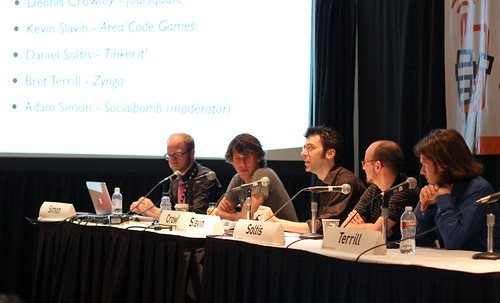SXSWi 2009: Social Gamers: Away From the Keyboard
Last March I went to SXSWi 2009. I posted the notes from two of the days, but conference exhaustion got in the way of me posting the notes from the last three days. After much delay, here they are.
Social Gamers: Away From the Keyboard
Room 6
Tuesday, March 17th
11:30 am – 12:30 pm
Online social networking sites are filled with data, content that can be used to feed rich and entertaining games. What can happen when we leave the computer behind and move gameplay into the real world? Our panel will explore technologies and methods that allow us to step away from the keyboard and create social games that work within the physical world.
Adam Simon: Moderator Creative Dir/Co-Founder, Socialbomb
Dennis Crowley: foursquare
Kevin Slavin: Managing Dir, Area/Code Games
Daniel Soltis: Interaction Designer, Tinker.it!
Bret Terrill: Dir of Business Dev, Zynga
Dennis Crowley:
Make the weekends more fun. Pacmanhattan Bring reward structure to social media.
Kevin Slavin:
Games were built around things they compute before they could communicate. How to use games to create spaces for people to connect. Do we need to maintain the legacy of game structure.
Parking Wars game for FaceBook. More people played the game than watched the show. More time playing the game than hours watching the show. Even more than ALL of A&E. Produce engagement around social communities.
Geo-cacheing. Area / Code Crossroads on Boost cell phones. Running down the street pursued by something invisible. Urban Golf
Plunder Geolocated PC game
Drop 7 iPhone development GPS integration
The apparatus that you bring with you makes a world visible that is invisible without it. It’s both there and not there.
Daniel Soltis:
Urban Games and hybrid games
Competitive picnicking In the game, you ask the people around you for food.
No tech in a lot of his games.
Two player pinball game
Often the things that work best are things that aren’t even part of the game.
Also does hardware hacking communities. How can we break our tools and use them for something else. Find other ways to use your London Underground card.
Bret Terrill:
Zynga: #1 social gaming company only a year old
Top game Mafia Wars It’s a very passive game. Come invite your friends to play the game and you’ll do better. Build your crew up as big as you can. 1.5 million active users.
Yoville: Virtual world 800,000 people playing every day. You gets points for social grooming.
Live Poker: A poker game with millions of users. You can play poker with your Facebook friends.
Adam Simon:
This is a new industry of social games on computers. How does this affect design?
Daniel Soltis:
Two of the biggest issues are learning curve and affordance. How do you tell people what they are supposed to be doing? We always think we are hitting people over the head and it’s never enough.
Bret Terrill:
We are trying to create device independent games.The iPhone is a different interface. Scramble is a fun game on the iPhone.
Kevin Slavin:
Design your game for PEOPLE not the location. The locations become important because the people are there.
Shark runners: The game goes on all the time. There are events that are triggered. We used the phone to surprise you. It’s a game that you play only five minutes a day, but which five minutes is up to the game.
Adam Simon:
How many games can we be playing at one time?
Dennis Crowley:
We finally have devices that are smart enough to know where are we are.
Daniel Soltis:
There is an attention that we will have to learn. Being in the virtual AND the real world.
Dennis Crowley:
Foursquare is a product that supposed to help you to connect to people.
Bret Terrill:
We use the game elements to help enhance our social relationships.
Women prefer cooperative play.
Kevin Slavin:
We play differently when we have a verifiable identity.
Bret Terrill:
Give away the game for free. Allow them to buy things that enhance the game experience. Only 1-5% of the pay for it. People will buy chips to get them.
Kevin Slavin:
What does it cost to support it? Hardware servers. There are costs of meaningful support of the community? What happens when they change their platform? The UR App Sucks Alert System. Hmm, Facebook must have changed something…
You have to have some way to tie revenue to the support.
It’s always the first question. What can we use these games for? It’s interesting that this is being applied to games.
Games can produce learning on their own.
Bret Terrill:
Most of the time we are happy and disconnected. Games make us happy. It isn’t changing the world, but it grainularly making the world a better place.
Daniel Soltis:
The player gets to choose how much to play. It’s less of an engaging game that beats you over the head with a message.
Dennis Crowley:
Make a reward system for people to do things that normally wouldn’t normally do.
Question: Unintentional negative things that came from games.
Dennis Crowley:
It’s amazing to me what people will go through to win a game. What would people do to be the mayor?
Kevin Slavin:
Someone almost got hit by a car by playing one of his games.
Daniel Soltis:
We should really play the cooperative version so it will fix our relationship.
Dennis Crowley:
How can we engineer awkward social situations?
Software that can persuade you to do something that you normally wouldn’t do.
Kevin Slavin:
The reverse webkins model. What physical things will we have that will affect the network. Ambient Devices, but playful.


Is there a way to see updates from this conversation? I would love to know where all their ideas lead them!
Comment by Katie — 5/19/2009 @ 6:42 am